Summary 
Handsomely mounted outdoor production stages the comedy at the Athens High School 1964 graduation ceremony, the lovers in school sweaters and bobby socks, the fairy world denoted by a sprawling set of purple and green with a musician upstage in the balcony. A chaotic blend of performances more schtick than acting along with angry fairies and projections that don't fit, but beautifully staged and scored.
Design
Directed by Christopher Liam Moore. Scenic design by Michael Ganio. Costume design by Linda Cho. Lighting design by David Weiner. Projections and video design by Alexander V. Nichols. Compositions and sound design by Sarah Pickett.
Cast
Richard Howard (Theseus), Judith-Marie Bergan (Hippolyta), Dawn-Lyen Gardner (Philostrate), Ted Deasy (Oberon), Terri McMahon (Titania), Gina Daniels (Puck), Robert Vincent Frank (Egeus), Tanya Thai McBride (Hermia), Joe Wegner (Lysander), Wayne T. Carr (Demetrius), Christiana Clark (Helena), Brent Hinkley (Nick Bottom).
Analysis
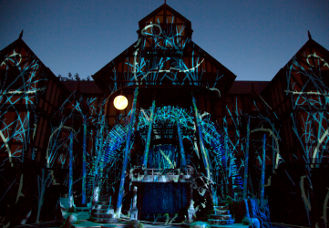
Christopher Liam Moore updates A Midsummer Night's Dream for the Oregon Shakespeare Festival, staging the romantic comedy at Athens High School with its "class of 1964" bandstand. The stage is festooned with maroon-purple bunting, and wooden steps lead to a platform decorated with white ribbons and a podium with an "A" hanging from its base. Beyond the platform and wooden steps, the set soars deep and high, with dark woods full of looming branches and hanging green moss, wooden planks lining the upstage wall like an unlucky horse shoe.
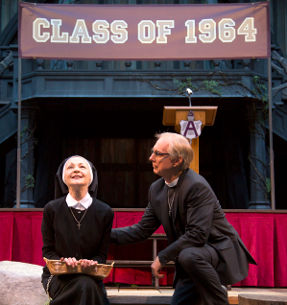
A wide-ranging score is played onstage with a variety of instruments by a wandering musician. At the beginning, the musician looks like a school big-band nerd, hauling a cello, wearing big black glasses and slicked hair, sporting an overly tight polyester suit with flood pants. In Moore's conception, the 1964 graduation ceremony is presided over not by the Duke and his soon-to-be bride, but by the high school's religious leadership, here "Father" Theseus and "Sister" Hippolyta. The old priest and nun are aided by Sister Philostrate, and he reads the names of graduates while she hands out diplomas, although the ceremony is disrupted by the angry shouts of Egeus. The four lovers are played over-the-top like 1950s TV high school caricatures, the boys in maroon "A" sweaters, the girls in bobby socks and skirts. Hermia is the defiant gum-chewing leader, spitting her gum into her father's palm at mention of "sweet meats," then jumping up and down at the idea of elopement before becoming solemn and raising three fingers in scouts' honor. The "fair" Helena, played by a tall African-American girl, is beseeched to remain quiet by Lysander's manic throat-cutting gestures. Almost lost are jarring references to an ongoing romance between Father Theseus and Sister Hippolyta - and all its attendant anti-authority - who draw gasps of shock with just the holding of each other's hand.
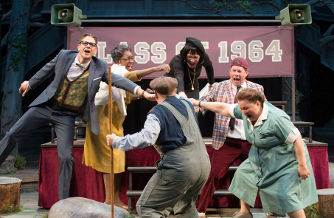
The rude mechanicals, here the sit-com-style faculty of the Athens High School, are more genuinely amusing than the young lovers. They appear 1.2, led by P.D. Quince, their female director, clad entirely in black, and by Bottom, the portly gym teacher - "hey, coach!" - wearing sneakers, baseball hat on backward, and a whistle around his neck. They dismantle the 1964 bandstand and discuss their show - Bottom: "let me play Frisbee too!" - joined by Snug the Janitor ("I am slow...of study"), Francis Flute as a rangy gangly nerd in black glasses and ill-fitting suit, Starveling a prim schoolmarm with a woolly sweater over her shoulders and black cats'-eye glasses, and a hair-netted lunch-lady Tinker with a constant expression somewhere between boredom, confusion, and surliness. Their shout of "Go Athens!" gives way to a long sequence during which the outdoor Elizabethan Stage, now nearing darkness during an evening performance, begins to glow with projections and lighting effects in neon-violet and acid-rock green. The stage walls soar thirty feet from the stage, half-encircling the stage while making the twilight darker and the lighting even more vibrant. Children play the fairies, some with rapid-beating wings upon their backs, one emerging from a giant toadstool trap carrying a white night-light globe, and they attach a line to a large opaque orb and hoist it to the fly to represent the glowing white moon. Puck appears 2.1 to chastise the fairies, an elfin female with a bemused smile who seems to be more content to observe the foolish mortals than to interact. She wears a hoop skirt and small butterfly wings on her back, benign and high-pitched, in direct contrast to Ted Deasy's lion-maned Oberon, roaring angry and prowling the stage, dropping to his knees in seething frustration at Titania's defiance.
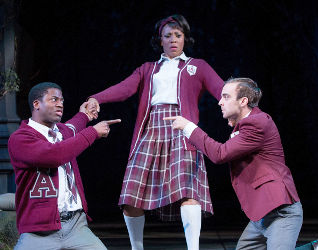
The antics in the enchanted woods are the comic core of the play, and in Moore's production both a highlight and a weakness. The young lovers entertain, with a few inspired moments scattered throughout Act 2 and Act 3, but these dumb teenagers merely act like dumb teenagers, and after a while the over-the-top mugging grows wearisome. Intercut with the unlikeably fuming Oberon and his smirking Puck, the core relationships are stage-conscious schtick rather than the delightful folly of youngsters in love. Helena begins with her 2.1 pursuit of Lysander, rushing onstage right behind him like a spaniel, carrying her plaid school lunchbox. When Helena begs him, she kneels and holds her hands up palms-down like paws, panting like a puppy, and when she kisses Demetrius he nearly succumbs, moaning in an insightful moment that indicates where his truer feelings lie. But he fights her off, slapping her hands and pushing away from an embrace, and he races off to have Puck's love spell miscast upon him. Moore focuses on Helena - Hermia arrives and rolls out her sleeping bag, pushing the amorous Lysander off a nearby stump so he must retire for the night hugging only his teddy bear - and she inadvertently rests her feet upon Hermia in her sleeping bag. Moments later, she flees the bedeviled Lysander, who quite humorously ties Hermia within her sleeping bag and follows in romantic pursuit.
The high-school double-triangle is also intercut with the 3.1 hempen homespuns, and Moore culls better moments from the more seasoned performers. Bottom lobbies for a prologue before returning to rehearsal with big white buck teeth and the ears and long bushy tail of a donkey. The tightly-wound school teacher Starveling gives a high-pitched squealing scream throughout the madcap escape, only stopping once Puck covers her mouth and everyone has fled. Brent Hinkley's Bottom then provides some astute comic moments, using his long tail like a microphone to croon a love song to Hippolyta, who responds in kind - "I love thee!" - until they sit beside one another on a stump like awkward teenagers struggling for something to say on a first date. Intermission comes once the confused-looking fairies receive their instructions to serve the not-so-handsome and not-so-talented Bottom.
Some of the whimsy wears thin by 3.2, however, with Moore re-beginning with an attempt at a 1930s Keystone Kops film - chase scenes set to music - with the lovers rushing from entrance to entrance, Hermia chasing Lysander, who chases Helena, who chases Demetrius, who chases Hermia. Some moments work better, like Puck explaining to Oberon the effects of her spell by sticking two plastic spoons into a Hostess Twinkie to evoke Bottom's appearance, Hermia unwittingly sitting in Oberon's lap to pull on her shoes, or the boys reacting physically to every gesture from the wildly gesticulating Helena, flopping like fish out of water, then becoming aroused as they caress and paw at her while she tries to scold Hermia. The silliness continues - Puck, from atop a stump, hands on hips: "lord, what fools these mortals be" - but with more and more reliance on physical sight gags, like the limbs-akimbo Lysander blocking Helena by straddling two rocks, the looming catfight scaring the boys to a safe distance upstage, or the boys demonstrating their attributes - flexing arm muscles, turning to display a rear end - then strutting offstage cheek-by-jowl to "fight." Moore concludes the lengthy sequence of chases and slapstick with high-tech projections of Puck speaking to each of the lovers from various locations all across the stage, some small (like on the moon) and some huge (against the expanse of upstage wall). The projections are characteristic of the entire production: an eye-candy spectacle that is initially jaw-dropping but really only partially successful - in this case akin to a Hollywood-like flexing of big-budget muscle - with the projections pre-recorded, the voice amplified, and Puck's larger-than-life face sometimes not even facing the person being addressed.
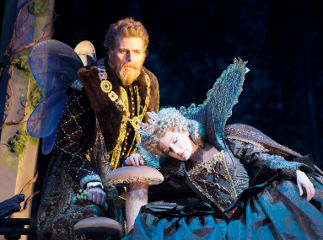
Moore handles Bottom and Titania with more subtlety, the fairy queen struggling like a schoolgirl 4.1 to catch her new love's eye, then Deasy's Oberon finally losing his bluster and showing not just compassion but remorse. The spell broken, Hinkley's Bottom ruefully pulls on his baseball cap and exits to a song from one the fairies, and Moore cuts to Father Theseus and Sister Hippolyta, certainly the most disturbing - and most interesting - choice of the production. Pointedly, Hippolyta removes her cross then requests help taking off her nun's habit, and upstage in the balcony, Theseus first kneels in prayer, then stands to remove his priestly collar. Everyone turns away in some embarrassment when the priest and nun share a kiss that becomes passionate, and Moore adds a touching moment when Egeus wakes all the lovers and puts Hermia's hand into Lysander's.
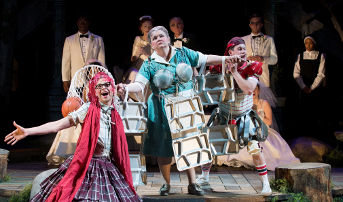
After Bottom's triumphant return - hair-netted lunch lady Tinker sobbing so balefully her mascara runs black down her face - and the news of their Pyramus and Thisby production ("our play is preferred!"), the stage is set for the Act 5 denouement. Theseus arrives in black tuxedo, arm in arm with Hippolyta in her wedding gown, each carrying a champagne flute as they welcome the four lovers in their white tuxedoes and white wedding dresses. The play is the usual mess, with Tinker's Wall speaking too quickly then too slowly before finally getting the pace just right by singing the monologue beautifully. The portly lunch lady has metal colanders over her breasts and the wall plates dangling from each arm are actually silver lunch trays with little individual compartments. She endures Bottom's Pyramus in his blazing red codpiece but when she falls down, they all struggle to get her back to her feet. After more sight gags - Thisby has basketballs for shoulders, along with a long red wig - Hinkley's Bottom steals the scene with his way, way over the top stage death: when he turns for his sword to commit suicide, it is not there, so he snatches a banana from the lunch lady and stabs himself with that, then pantomimes first drinking poison, then starting a chainsaw and eviscerating himself, followed by slashing his jugular in a horrendous shaving mishap, then an attack from a kung fu death star, and finally a gunshot to the temple. Thisby delivers her final lines in her normal voice, and the performers finally bid their audience "adieu!" only to return for the Bergomask dance disappointed that the newlyweds have already exited.
Hinkley's Bottom exits last, a bit unnerved by the half-remembered Puck waggling her fingers at him from upstage, and after the big orb of the moon is lowered by the fairies and concealed within a tree trunk, purple and blue lights criss-cross the stage, and Puck gives her benediction as Moore's sprawling and kitschy production concludes.